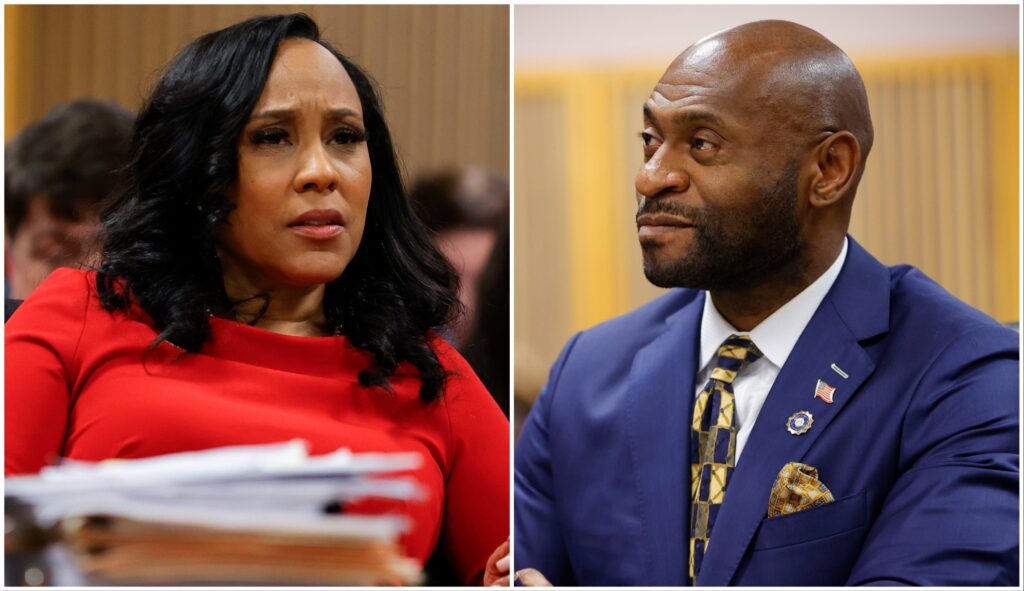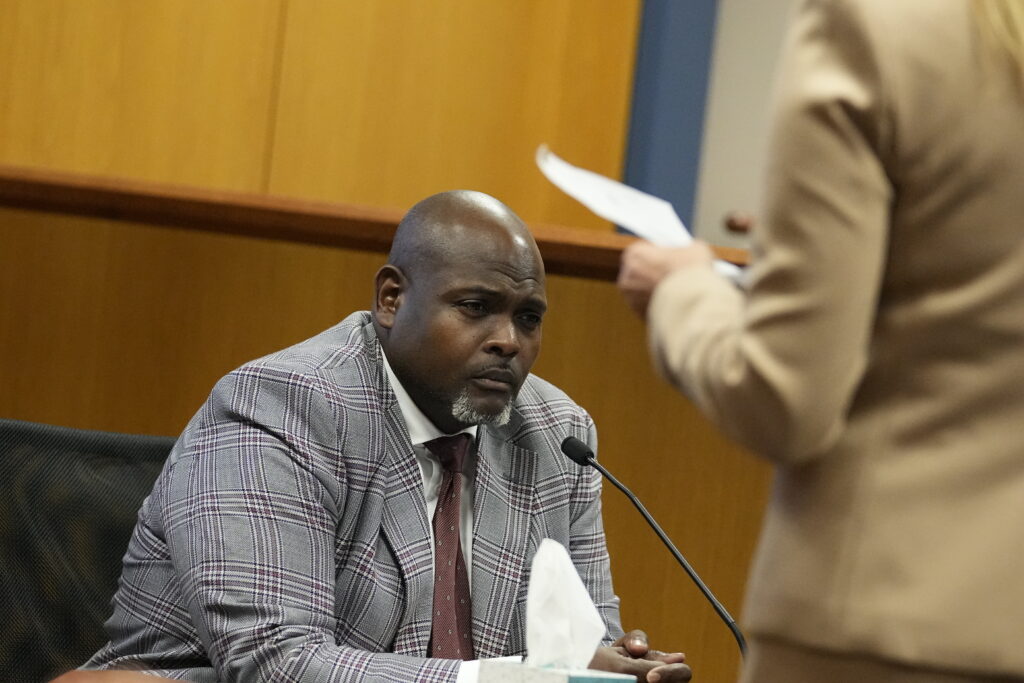The judge presiding over former President Donald Trump‘s Georgia racketeering case ruled Friday that Fulton County District Attorney Fani Willis can remain on the case only if she removes the special prosecutor, who was her boyfriend.
In the much-anticipated ruling, Superior Court Judge Scott McAfee said Willis must address the appearance of impropriety sparked by her romantic relationship with special prosecutor Nathan Wade, who has billed more than $700,000 in legal fees to county taxpayers while helping pay for trips he took with Willis.

“The established record now highlights a significant appearance of impropriety that infects the current structure of the prosecution team — an appearance that must be removed,” McAfee wrote.
The decision effectively means Willis can stay on the case against Trump, a victory for her that did not come without a minor rebuke that would require her to remove Wade as the lead prosecutor underneath her. But the order follows numerous personal and professional costs to her after embarrassing details about her personal life and romantic relationship became a national spectacle inside the same courtroom in which she seeks to hold a trial against Trump and 14 co-defendants.
Willis has asked for a trial to begin in August, and McAfee has yet to set a firm date.

McAfee made his decision following a tumultuous legal saga that began when one of Trump’s co-defendants, Mike Roman, alleged in a Jan. 8 motion that Willis and Wade were involved in a romantic relationship. The point of contention became not the relationship itself but whether Willis benefited from appointing Wade to handle the case.
“You think I’m on trial. These people are on trial for trying to steal an election in 2020,” Willis said during fiery Feb. 15 testimony on the witness stand, where she was questioned about the relationship with Wade. “I’m not on trial. No matter how hard you try to put me on trial.”
The judge heard closing arguments on March 1 over removing Willis from the case against Trump. Defense attorney John Merchant said then that the revelations over the past several weeks should “make clear” that there was at the very least “an appearance of a conflict of interest” that would be sufficient to remove Willis.
McAfee denied the defendants’ effort to disqualify based on “forensic misconduct,” which defense attorneys argued should include the public comment Willis made about the case during at least two speeches at a historically black church. But McAfee did say that Willis’s comments were “improper,” signaling the “time may well have arrived for an order preventing the State from mentioning the case in any public forum to prevent prejudicial pretrial.”
In hearings over the past several weeks, defense attorneys attempted to bring forward witnesses and evidence that support their allegations against Willis — specifically that she financially benefited from the relationship, that it began before she hired him in late 2021, and that both prosecutors lied under oath about when they started dating.
McAfee said he could not place any “stock” in testimony from Terrence Bradley, Wade’s former law partner and divorce attorney, who sent texts to a defense lawyer suggesting that the relationship began earlier than prosecutors’ claim. Bradley had said from the stand that the texts were speculation and not based on facts.
“His inconsistencies, demeanor, and generally non-responsive answers left far too brittle a foundation upon which to build any conclusions,” McAfee wrote.

Trump attorney Steve Sadow issued a statement announcing that while defendants are “respecting” this court’s decision, “we believe that the Court did not afford appropriate significance to the prosecutorial misconduct of Willis and Wade, including the financial benefits, testifying untruthfully about when their personal relationship began, as well as Willis’ extrajudicial MLK ‘church speech,’ where she played the race card and falsely accused the defendants and their counsel of racism.”
“We will use all legal options available as we continue to fight to end this case, which should never have been brought in the first place,” Sadow said, suggesting that defendants might seek to pursue appeals over the dispute.
To underscore the claims about the relationship timeline, Trump’s attorney and counsel for his allies highlighted Wade’s cellphone data, which they obtained through a subpoena. They said the cellphone data showed he made several visits, including some late at night, to the area where Willis was living at the time before they said their relationship began.
McAfee said that he considered the cellphone data in his final decision.
“Even after considering the proffered cellphone testimony from Defendant Trump, along with the entirety of the other evidence, neither side was able to conclusively establish by a preponderance of the evidence when the relationship evolved into a romantic one,” McAfee ruled.
In a brief filed on March 6, Willis argued in her final pitch to the judge that there should be an actual conflict of interest to warrant disqualification rather than the appearance of one, as the defense argued.
“Every Georgia case that has addressed the issue has reached the same conclusion: in order to authorize a trial court to disqualify an elected district attorney, an actual conflict of interest must be proven,” the district attorney’s office wrote. “No prosecutor in this state has ever been disqualified on the appearance of a conflict.”
CLICK HERE TO READ MORE FROM THE WASHINGTON EXAMINER
Trump and most of his other co-defendants pleaded not guilty to their charges, and McAfee’s ruling enables the case to move ahead when either Willis or Wade steps aside. Four co-defendants have accepted plea deals with prosecutors.
Read the full order here:
2024.03.15 Order on Motion to Disqualify by Kaelan Deese on Scribd
